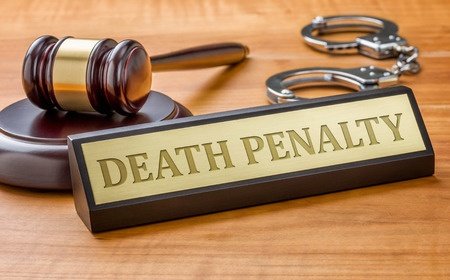Lawmakers in the House of Representatives were made to choose between two types of death – death under summary killings, or death under capital punishment?
This was the question posed by justice committee chairperson Oriental Mindoro Rep. Reynaldo Umali in his sponsorship speech at the resumption of the plenary debate on the death penalty on Tuesday night.
Umali asked his colleagues to choose between death after due process, or death without due process, referring to the spate of extrajudicial killings of suspected drug criminals by masked assassins at the height of the administration’s war on drugs that has claimed over 7,000 lives already.
“Do we not see the reality that compels us to address the challenge ahead of us? Take your pick – death without due process, or death after due process?” Umali said.
READ: Death penalty bill reaches House plenary
Umali lamented that the extrajudicial killings in the country made international news and branded the Philippines as a land governed by the rule of man, not the rule of law.
Umali said death penalty is a fitting response to addressing criminality, and an effective measure to restore respect for the law of the land.
He said restoring the capital punishment is needed to instill fear in criminals, who continue their nefarious activities even behind bars.
Umali said reimposing the death penalty would result in a “re-engineered” justice system.
“We deem it imperative that we resort to measures to ensure the interests of the greater good – those who are crying for justice,” Umali said.
“I believe the reimposition of the death penalty is a needed legislative measure as we transition to a re-engineered justice system,” he added.
Meanwhile, in his sponsorship speech, House committee vice chairperson Leyte Rep. Vicente Veloso said he had wanted to impose death penalty on convicted child rapists when he was a Court of Appeals justice.
“House Bill 4727 only seeks to impart on the courts the option to penalize the offender with death penalty. Such is very important in my experience,” Veloso said.
Veloso said there is also nothing unconstitutional on the proposed death penalty reimposition under House Bill 4727 because Congress under the 1987 Constitution may reimpose it.
He slammed critics from the Catholic Church, which he said should not concern itself with the mandate of Congress to restore capital punishment on heinous crimes.
“It is not anybody’s concern, it is not the concern of the Church, that death penalty be passed. The Constitution is explicit, it is solely the concern of this Honorable body,” Veloso said.
He added that the country is not bound with its international agreements against capital punishment.
“The Philippines is not bound by any state party…because such agreements are not generally accepted principles of international law,” Veloso said.
Anti-death penalty advocate Albay Rep. Edcel Lagman earlier said the Philippines is a signatory to the United Nations Convention against Illicit Traffic in Narcotic Drugs and Psychotropic Substances of 1988 that prescribe life imprisonment, not death penalty.
Veloso warned his colleagues that they would be accomplices to heinous crimes if they do not approve the measure of restoring death penalty.
“Isipin mo ang lahat ng heinous crimes sa paligid mo… At the end of the day, kung sino man sa mga kamag-anak natin ang mabibiktima nila, kasalanan natin yan. Ang dugo nila ay magiging dugo sa ating kamay, dahil hindi natin ipinasa ang House Bill 4727,” Veloso said.
(Think about all the heinous crimes around you… At the end of the day, if we have loved ones who are victims of heinous crimes, we are at fault, because their blood is in our hands, if we do not pass House BIll 4727.)
The bill restoring death penalty is seen as a priority legislation in the House of Representatives.
The bill seeks to impose death penalty on more than 20 heinous offenses, such as rape with homicide, kidnapping for ransom, and arson with death.
READ: Death penalty ‘priority’ bill of lower house — Umali
Speaker Pantaleon Alvarez, Duterte’s staunch ally in Congress, was among the authors of the bill seeking to reimpose the death penalty after former President and now Pampanga Rep. Gloria Macapagal-Arroyo abolished capital punishment in 2006 for its failure to deter crime.
Alvarez filed the bill pursuant to President Rodrigo Duterte’s campaign promise of returning capital punishment against heinous criminals.
READ: First bill in Congress seeks reinstatement of death penalty
Alvarez’s bill seeks to reimpose the death penalty for heinous crimes listed under Republic Act 7659, including murder, plunder, rape, kidnapping and serious illegal detention, sale, use and possession of illegal drugs, carnapping with homicide, among others.
In the bill he co-authored with Castro, Alvarez said there is a need to reimpose the death penalty because “the national crime rate has grown to such alarming proportions requiring an all-out offensive against all forms of felonious acts.”
“Philippine society is left with no option but to deal with certain grievous offenders in a manner commensurate to the gravity, perversity, atrociousness and repugnance of their crimes,” according to the bill.
Duterte won the elections on a campaign promise to restore the death penalty by hanging, even making a snide remark that the convict’s head should be severed by hanging. Alvarez said Congress would look into the cheapest way for the death penalty, either by firing squad, lethal injection or by hanging.
RELATED STORIES
Death penalty: ‘The cheaper, the better’
Aguirre to solons: Death penalty will instill fear among criminals
Solons warn of death penalty railroad by limiting it to drug cases
